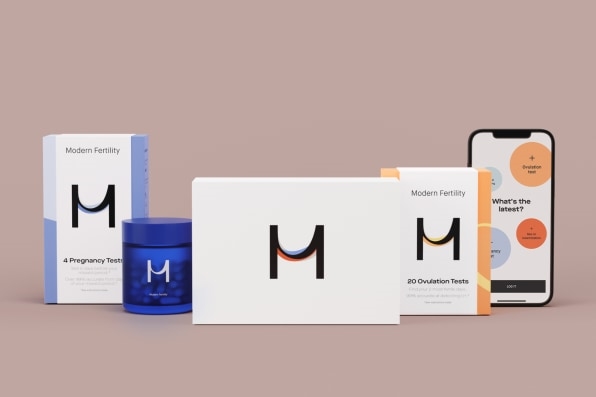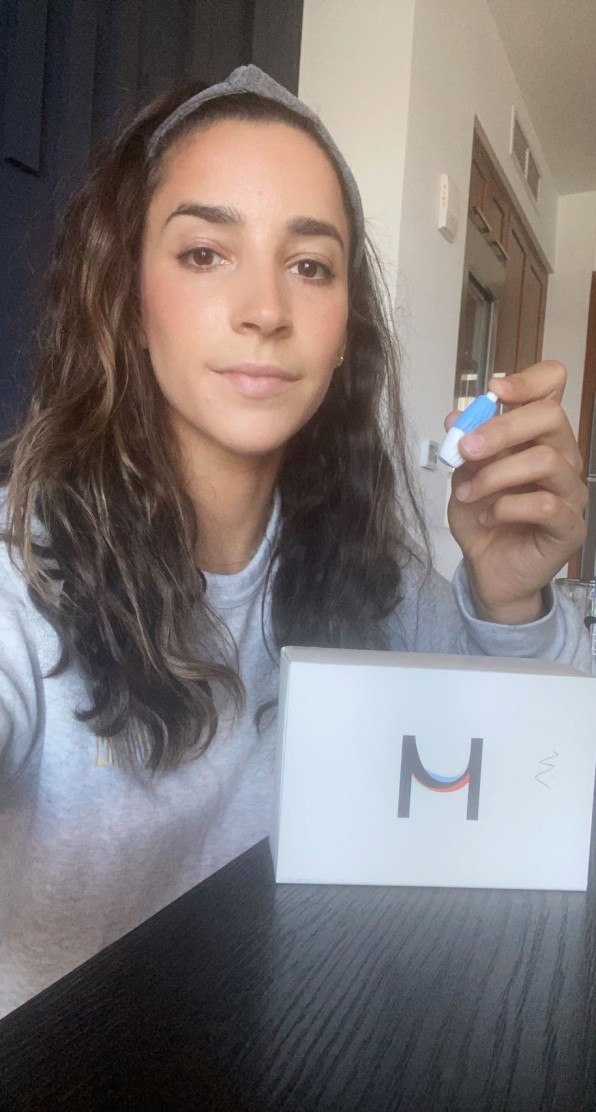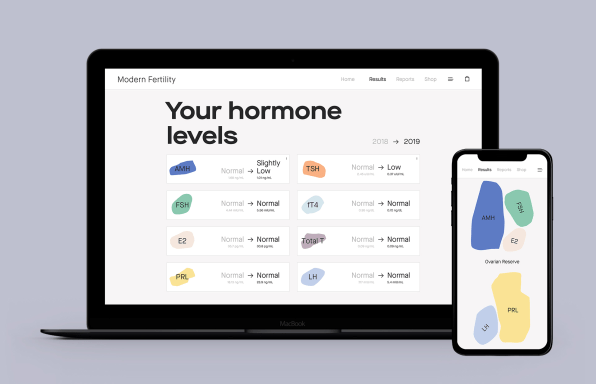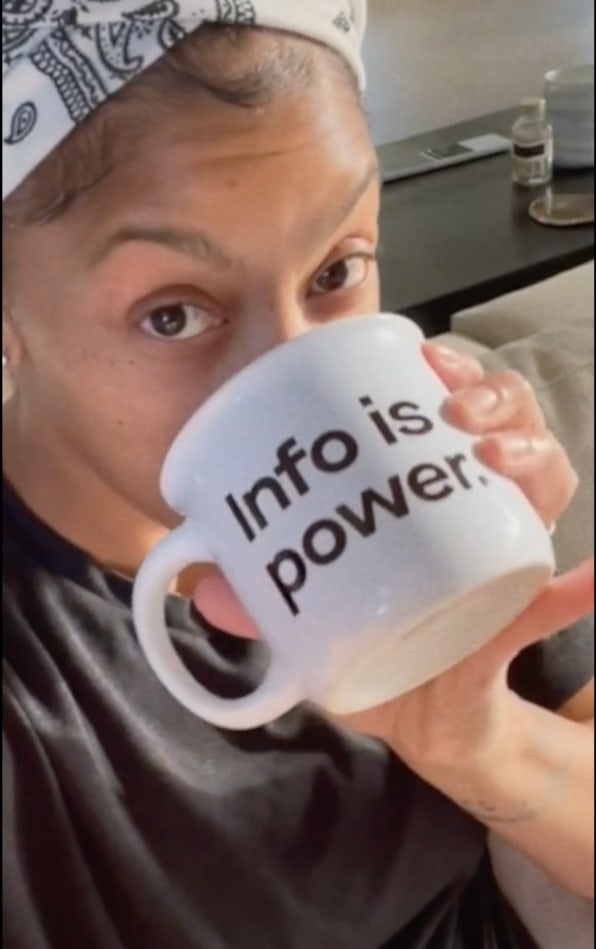Exclusive: Modern Fertility announces a new campaign featuring female athletes
It started, as so many things do, with an Instagram DM. About a year ago, WNBA player Nneka Ogwumike approached Modern Fertility, the at-home fertility testing company, with an idea for a potential partnership. The WNBA had established itself as a leader in women’s sports with a historic new collective-bargaining agreement that secured significant raises and paid parental leave for players. Could they also help destigmatize conversations around reproductive health?
As the president of the WNBA players association, Ogwumike was instrumental in negotiating the collective-bargaining agreement. She was already focusing on female reproductive health as part of her work to promote equality in sports—and Modern Fertility seemed like a natural partner.
“We’re told stories, even from our coaches and families, that you have to play as long as you can and have kids as early as you can,” Ogwumike says. “So with that comes this fear of having to give up your career to have children in a world in which everyone is telling you that you should have kids. And that’s not everyone’s story.”
Ogwumike worked with Modern Fertility to provide its fertility tests—which measure seven hormones that influence fertility, including AMH, an indicator of ovarian reserve—to all WNBA players free of charge, along with access to additional consultation. Their partnership has also inspired a new campaign from Modern Fertility, which centers around the voices of formidable athletes like the WNBA’s Candace Parker and pro soccer player Sydney Leroux and seeks to catalyze a more candid discussion of reproductive health and fertility across pro sports.

Plenty of working women grapple with the delicate balance of family planning and career aspirations. But athletes rely almost entirely on their bodies for their careers, making decisions about their reproductive health especially fraught. “Having a family was super important to me,” says Parker, who had her first child at 23. “I was able to have my daughter at an early age and go through the grind of balancing being a mom, but also continuing to do what I love. I wouldn’t change it in any way, shape, or form—however, I think everybody’s journey is different.”
The implicit message to many athletes has been that they shouldn’t compromise their careers by having children too early—an idea often reinforced by public reactions to players who do get pregnant in the prime of their careers. “There is a huge stigma around being a mom and an athlete,” Leroux shared as part of Modern Fertility’s campaign. “When I first got pregnant, everyone said, ‘Oh, she’s going to retire.’” And while athletes are encouraged to track just about every aspect of their body and performance, fertility is often a black box for many of them. “You’re almost put in a position where you have to be forced to ask questions that you don’t know you should be asking,” Parker says. “That’s the challenge. You talk about fertility hormones, and people don’t know what that is or what that’s about until [they’re] going through the process.”

[Photo: courtesy of Modern Fertility]
These are the types of experiences Modern Fertility hopes to elevate with its campaign, which launched today with an introductory video, and bears the tagline, “I refuse to let my fertility be a mystery.” Over the next month, the campaign will roll out testimonial accounts each week from Parker, Leroux, soccer player Kelley O’Hara, and retired gymnast Aly Raisman.

[Photo: courtesy of Modern Fertility]
“The most powerful thing is us just getting out of the way,” says Modern Fertility cofounder Carly Leahy. “For us, from a brand standpoint, it’s just: Let’s support these amazing people in telling their stories and talking about how they’re thinking about this very complicated issue.”
The campaign is certainly a first for Modern Fertility in terms of scope—and a strategic one at that—but it’s also a microcosm of the knowledge gap the company has tried to tackle since its inception. “Athletes seem to embody almost the most extreme case of what we’ve been talking about with women day in and day out in our community, around needing more information to plan for their own future and life,” Leahy says. Modern Fertility, which was acquired for more than $225 million last year by digital health company Ro, has focused on what it calls the preconception space because fertility testing has not traditionally been accessible or affordable for most women, with costs crossing $1,000. The first time many people get any kind of fertility testing is after struggling to conceive. (Modern Fertility’s test retails for just $159 and requires only a finger prick.)

When people are empowered with this kind of information earlier in their lives, Leahy says, it gives them more choices, regardless of what their family planning might look like. “There’s no crystal ball for fertility—there’s no test that you can take that [says] ‘Yes, you’ll have a healthy baby tomorrow,’” Leahy says. “But women are smart, and they understand: If I check my cholesterol, it doesn’t tell me if I’m gonna have a heart attack tomorrow or not. It helps me understand where I am and helps me plan ahead.”

[Photo: courtesy of Modern Fertility]
That’s not to say fertility tests are a complete solution, or that they can mitigate the effects of more systemic issues, from the dearth of affordable childcare options to the reality that women disproportionately shoulder caregiving when they do choose to have children. (There’s also some debate about how effective AMH and other hormones are as indicators for people who aren’t already dealing with infertility.) But since Modern Fertility distributed tests to WNBA players, Ogwumike says, conversations about fertility and family planning are already happening more frequently across the league. She’s already heard from players who want to get fertility tests for their partners, and others who want to understand how birth control might impact test results; Ogwumike herself had questions about how polycystic ovarian syndrome could impact her fertility and hormones.
“What I’ve learned most is there’s been a lot of fear mongering for women and their careers when it comes to fertility,” she says. “And when you’re given the resources that you need to make those decisions for yourself, it’s really not as scary or imminent as people make it seem. Everyone’s situation is different, but I think the lack of information has created fear.”
And while that pressure may be heightened within the realm of sports, Ogwumike knows that people across all kinds of industries and backgrounds face hurdles when it comes to navigating their reproductive health alongside their careers—and that seeing athletes speak out can help destigmatize the experience for all of them.
“When we signed our collective-bargaining agreement in 2020, the support that we got and the feedback that we got from women that were not even involved in sports was remarkable,” she says. “After having such a historic year, it was clear to us that we represent a lot of what women are going through—however unconventional our jobs are, we are also going through the same things.”
(29)


